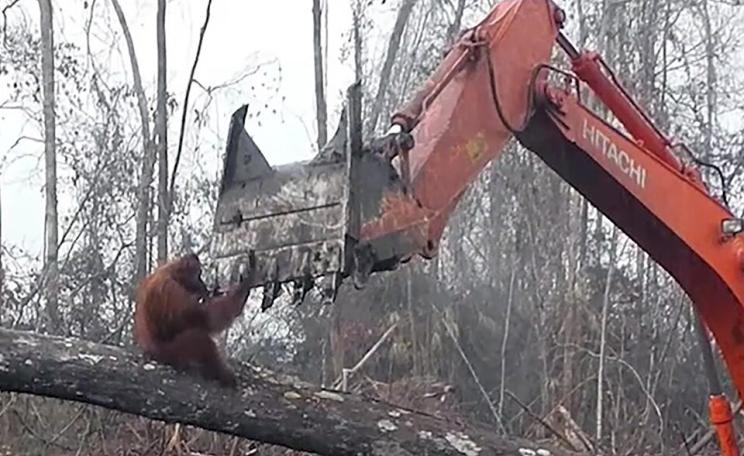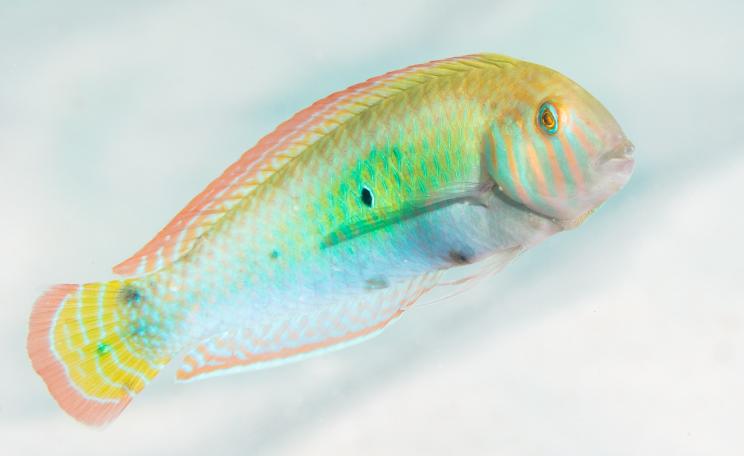As we liberated the land, on some level it also felt like we too were somehow being liberated. It felt like a sacred act; an apology, a reconciliation.
All that exists right now is the wolves, the forest and the mystery pulling me deeper and deeper into the primeval forest. I've been tracking the wolves for hours. Their profound presence is vivid in their enormous paw prints that lace through the snow.
After many hours I eventually tire, and look for a place to rest. I peer inside a great fallen oak, and find a central cavity so large I can sit upright inside. All along the cavity walls, the long fibres of the decaying tree are coming undone, here shaggy hay-like lumps fall from above, there black shatterings into cuboid charcoal-like shapes.
I find myself spending the whole night inside the tree, holding vigil for the wild. Throughout the night I hear the wolves in the distance, the howling cry of wilderness echoing down through the ages, as if to remind us who we once were; who we could be again. Calling us back into the family.
Agents of regeneration
When I first arrived home from Bialowieza, Europe's last primeval forest, I was desperate to return, sensing there was so much more depth and mystery to explore in the wildness of the place.
I spent some time on rewilding land near my home in west Wales and decided not to rush back. I realised that though I had left the forest, the forest and its wildness had not left me.
And although there is no 'true' wilderness in any of the landscapes I know as home (the roots of the word wild are in willed, as in self-willed) through my time spent on rewilding land, and participation in active rewilding, I have come to realise it is not lost forever.
It is not a pure state which once defiled can never be attained again. Wildness remains dormant in the land – and in us – patiently waiting for her time to come again. And what's more, we can participate in her return; wilderness does not have to mean the absence of human participation.
Indeed, for wildness to return to our domesticated landscapes we will have to participate in its creation, for we have eliminated all of the key agents of regeneration: wolf, beaver, boar, bear, and others.
Rewilding process
And in this participation lies reciprocal healing, for the land and the human spirit, as I've found in the time I've spent working on rewilding projects.
Ripping out internal fences was one of the first jobs at Bwlch Corog, a site recently acquired by the Cambrian Wildwood rewilding project in west Wales.
Removing the borders, the boundaries, the containment into sizes and shapes for easy human perception and control, was an exhilarating experience. As we liberated the land, on some level it also felt like we too were somehow being liberated. It felt like a sacred act; an apology, a reconciliation.
Beneath the necessary work of restoring our destroyed landscapes is perhaps this other work that rewilding asks of us: to step back into the family – to participate.
As we liberated the land, on some level it also felt like we too were somehow being liberated. It felt like a sacred act; an apology, a reconciliation.
As key agents in the ecosystems we dominate, humans must be part of the rewilding process – we too must be rewilded.
Deep nature
That process includes reconnecting with nature, just as rewilding aims to reconnect core wilderness areas, and reclaiming the ancient spiritual relationship to nature that we have forgotten in recent human times.
And so, an invitation. In August, I will be holding a wild nature immersion retreat at Bwlch Corog. The invitation is to come and rewild yourself, participate in wildness, commune with the wild and discover the wildness that lies dormant within you.
We'll learn to interpret the language of birds, the body language of trees, and the tracks and signs of wildlife – magical doorways that reveal the ever-unfolding dramas of the natural world around us.
And then, with that unique knowledge, open to the sacred within nature, the divine mystery that lies beneath the surface of all things, and see what awaits for our souls to discover when we commune with the wild...
Imagine herds of wild - and surprisingly friendly! - horses, regenerating landscapes, overnight solos, wild swimming, deep nature connection, and entering a magical realm of animate nature, where rocks and trees and birds can communicate. This world of sacred ecology awaits us – we only need to step through the door that has always been open.
Combining modern science with ancient wisdom, practical ecology and spiritual practise, nature connection and rewilding, it will be a 5-day experiment of re-imagining – or remembering – the world as sacred, animate... wild.
This Author
Kara Moses is a facilitator of rewilding – landscapes and people – and a freelance writer. She is an associate fellow of St Ethelburga's. Rewilding Spirituality: Wild Nature Immersion runs from 17-21 August in west Wales. Book before 5th August to guarantee a place. Book here. More stories of Kara's time in Bialowieza and Bwlch Corog can be found in this essay recently published in Emergence magazine.







